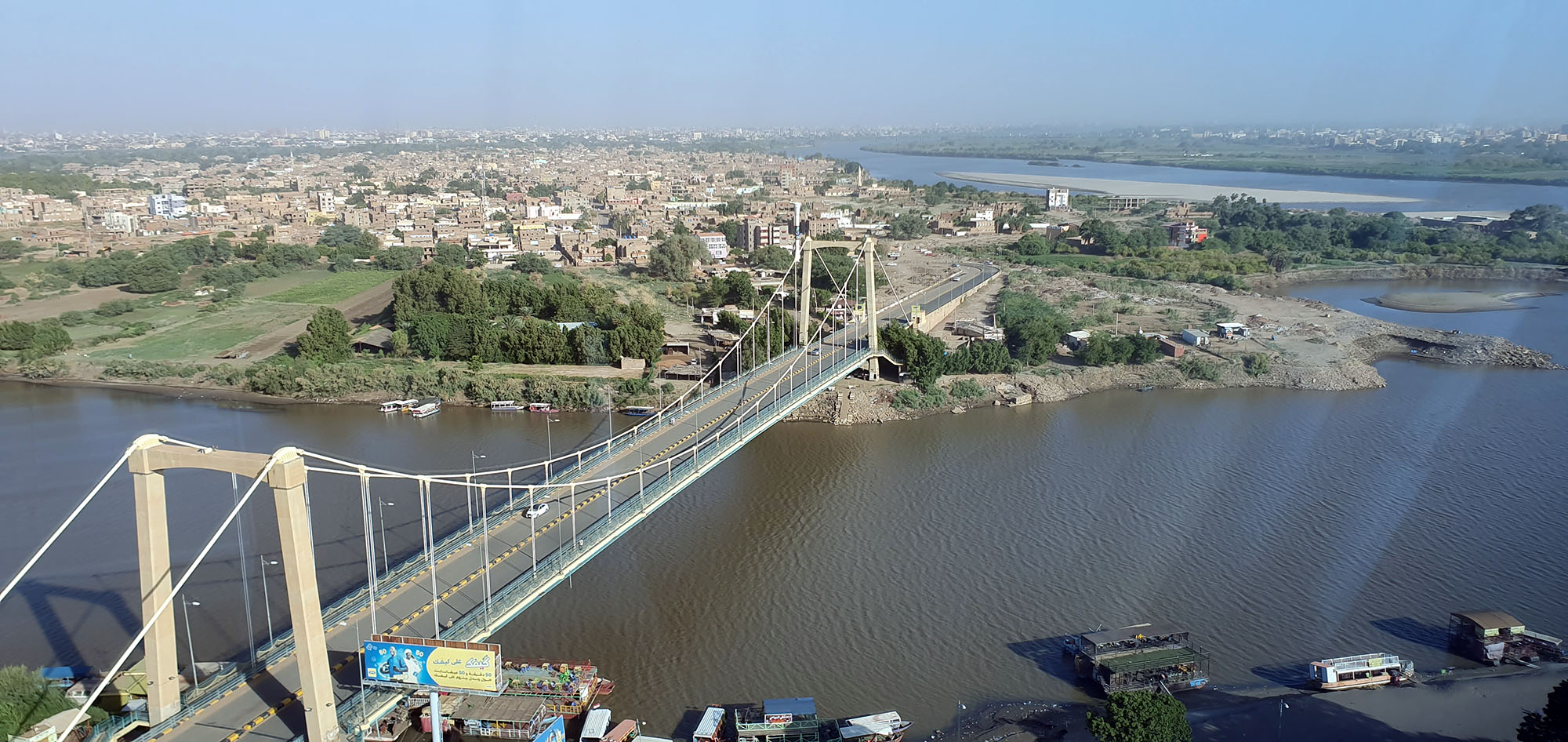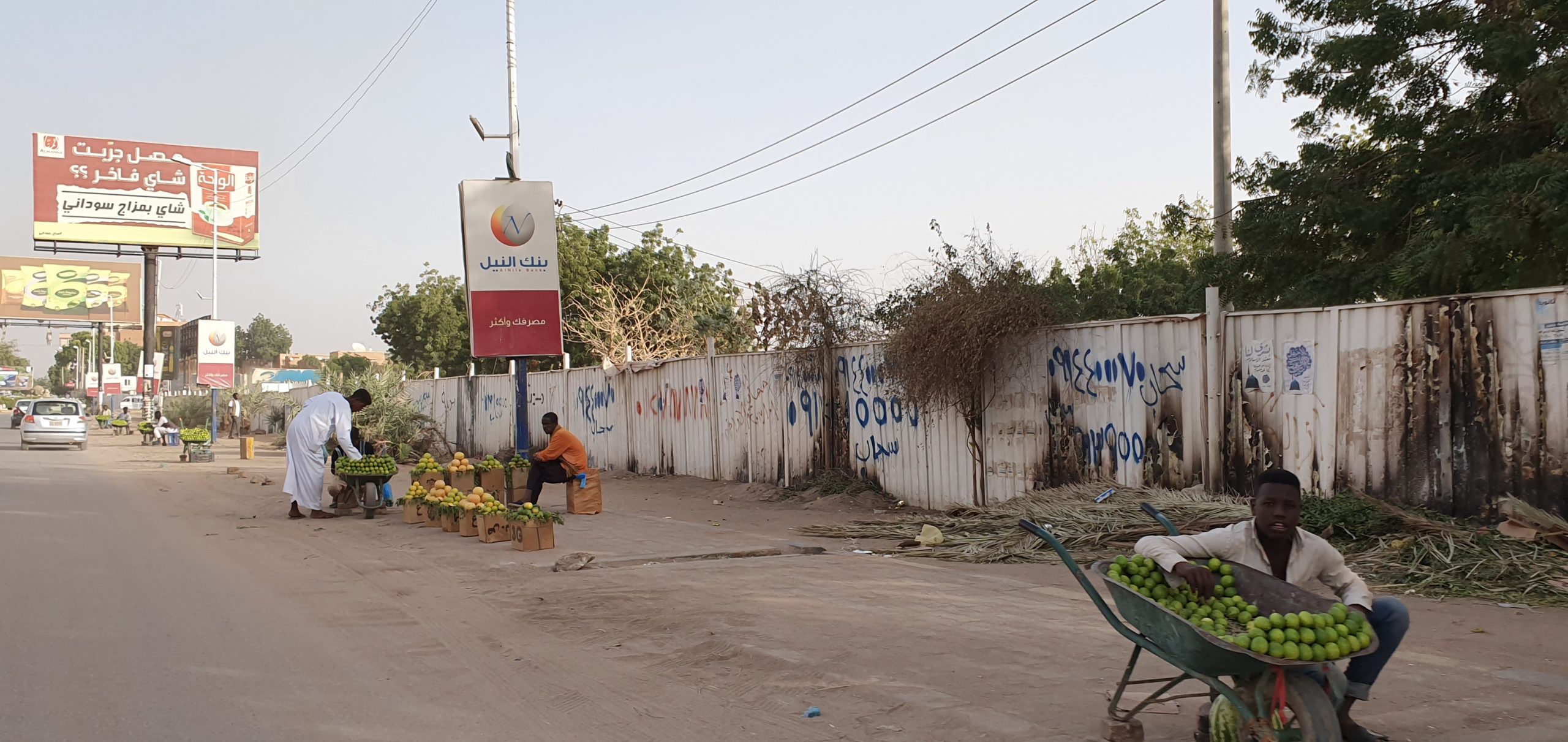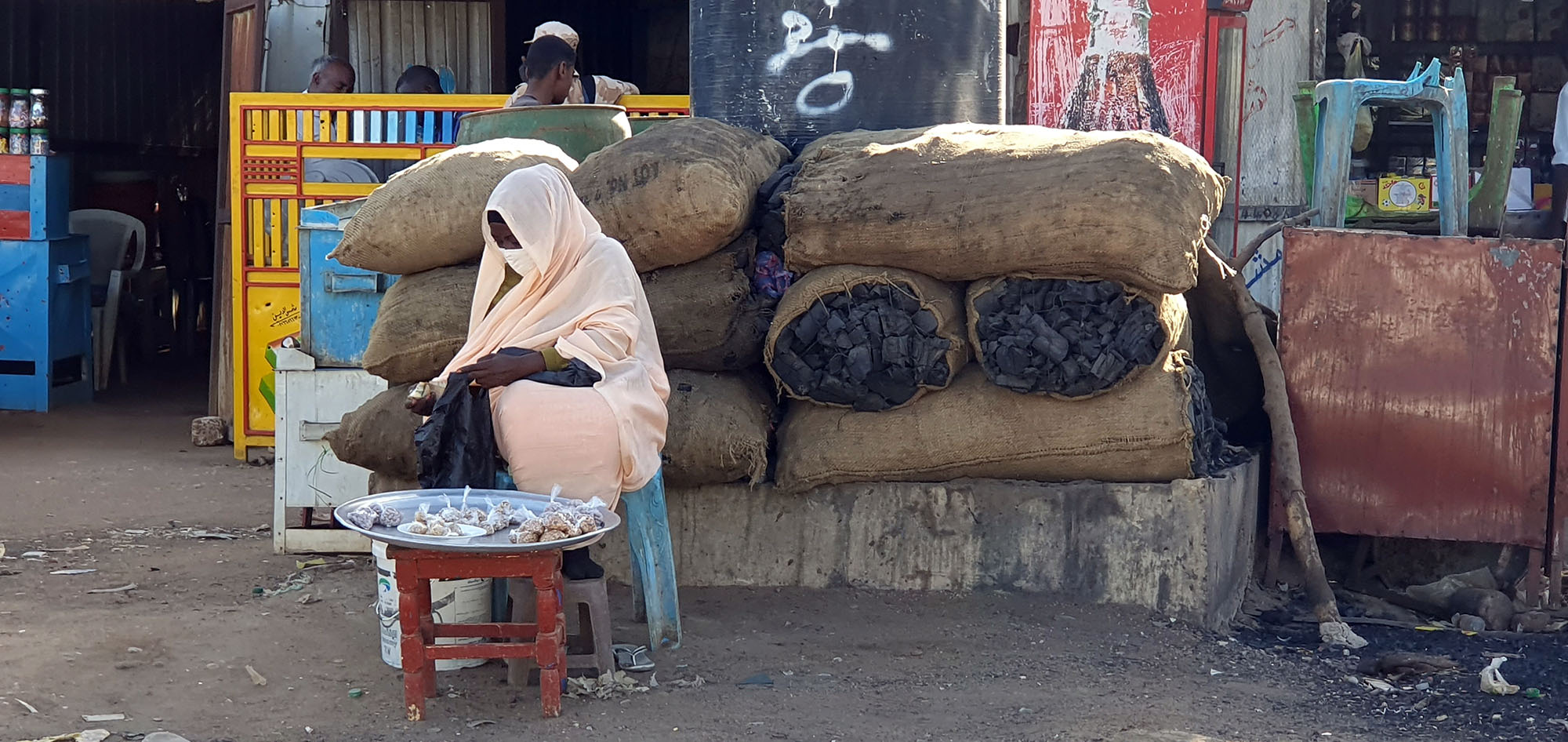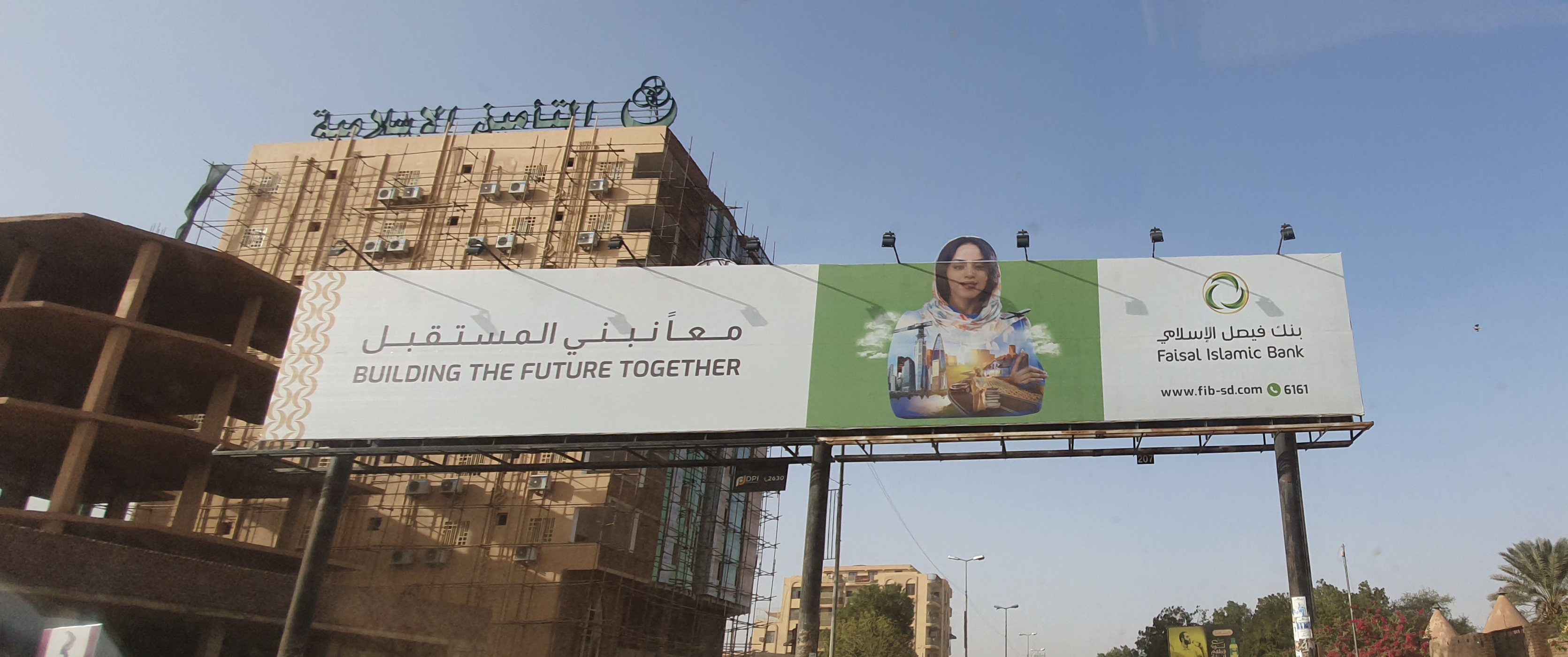The restaurant on the 16th floor of the Corinthia Hotel in Khartoum affords an incredible view of the spot where the White and Blue Niles converge. The White Nile flows from the great lakes of equatorial Africa, with the shorter Blue Nile, whose remotest source is the Felege Ghion spring in the Ethiopian highlands, contributing nearly 90% of the water carried by the Nile proper.
The slow, sweeping waters through Khartoum contrast with the darting traffic at its edges, both passage of the river and the country’s history marked by a series of bridges — from the bascule 1909 Blue Nile Road and Railway Bridge completed by the Cleveland Bridge & Engineering Company and the blue steel truss Omdurman Bridge (also known as the Redemption Bridge or the Old White Nile Bridge) built by Dorman Long in 1926, 30 years before independence, to the modern Tuti suspension bridge opposite the hotel.
Not for nothing is Khartoum translated by the locals into the “hose” or “elephant’s trunk”.
The 7,000km Nile exemplifies the ties that bind the region, whatever the politics and beliefs stretching their people apart. The controversy surrounding the construction of the Grand Ethiopian Renaissance Dam (GERD) on the Blue Nile both underscores the extent of the self-reliance and the extent of political failure in finding a resolution.
 The Tuti suspension bridge over the Nile. (Photo: Greg Mills)
The Tuti suspension bridge over the Nile. (Photo: Greg Mills)
A 1929 agreement between Great Britain and Egypt, which was reinforced by the 1959 Nile Waters Agreement between Egypt and Sudan, allocated 55.5 billion cubic meters of water annually to the former and 18.5 billion cubic meters to the latter. With the total Nile flow estimated to be 84 billion cubic meters, virtually nothing is left to the other eight states in the river’s basin, which were not parties to the accord because they were either colonies at the time or, in the case of Ethiopia, ignored entirely.
Now the GERD, just 15km from the border with Sudan, which will take as long as 10 years to fill from 2020, threatens this lifeblood, at least in the opinion of Cairo, even though the dam is just half the capacity of the High Aswan.
The GERD (the eighth-largest water reservoir on Earth) will soon join Egypt’s High Aswan Dam (the third largest) in the unprecedented combination of two major, multipurpose dams operating on the same river system with no agreement for water management and coordination in place.
 The 7,000km Nile exemplifies the ties that bind the region. (Photo: Greg Mills)
The 7,000km Nile exemplifies the ties that bind the region. (Photo: Greg Mills)
While tensions remain over Ethiopian ambitions, the region is inextricably and increasingly interdependent in terms of the ties of people, goods and infrastructure. Egypt is the fourth-largest market for Sudan’s exports at 10% of the total, with Ethiopia the fifth largest, comprising 3.6% of exports. Sudan’s neighbours absorb a total of 14.2% of its exports. There is more to this than the flow of goods. There are about 50,000 Sudanese officially living in Ethiopia, and, during the Tigrayan crisis, at least 65,000 Ethiopians in Sudan.
On paper, the risks to Egypt, compared with the gains for Ethiopia of the irrigation and hydropower possibilities from the 6,350-megawatt GERD, are small, reflecting the small role played by agriculture (11% of GDP) and hydropower (10% of total generation) in modern Egypt. Yet the impact on Egypt’s national identity of the Nile, and pride is considerable, risking irrational responses, with Sudan caught in the middle between these two 100-plus million regional population giants.
Khartoum itself, a sprawling city of five million, about a quarter of whom live in poverty, is ironically rain-poor.
 Street view, Khartoum. (Photo: Greg Mills)
Street view, Khartoum. (Photo: Greg Mills)
Agriculture contributes an estimated 28% of Sudan’s GDP, with more than 40% of the labour force employed in this sector. One of Sudan’s main cash crops, cotton, accounted for 4.3% of total export earnings in 2018.
Sudan held an estimated five billion barrels of proven oil reserves as of 2016, ranking 23 in the world and accounting for about 0.3% of the world’s total reserves.
As oil came on stream, Sudan boomed. By 2010 it was adjudged to have the world’s 17th-fastest-growing economy. Then, with the 2011 secession of South Sudan, where 80% of the oil was located, Khartoum’s world imploded. Even with a 2012 revenue agreement in place to export oil from the South via a pipeline through the North to Port Sudan, the civil war in the South has slowed the flow, compounding the effect of the downturn in the global oil price.
 Agriculture contributes an estimated 28% of Sudan’s GDP. (Photo: Greg Mills)
Agriculture contributes an estimated 28% of Sudan’s GDP. (Photo: Greg Mills)
Yet, even when the economy was booming and oil production reached 450,000 barrels per day in the unified Sudan, the income was spent less on people than the politically connected and powerful. Such is the consequence of a failure of democracy and accountability.
Sudan’s politics read like a handbook for African coups. Independence from Britain on 1 January 1956 was followed by a military coup in November 1958 and the establishment of the Supreme Council of the Armed Forces.
Six years later a civilian government was formed, but within five years a Revolutionary Command Council had taken power, with Colonel Jaafar Muhammad an-Nimeiri at its head. As resistance to his increasingly Islamist rule escalated, Nimeiri was, in turn, overthrown in a bloodless military coup while on a visit to the US in April 1985, and General Abdel-Rahman Swar al-Dahab became head of state. Elections followed the next year, with the head of state functions assumed by a six-member Supreme Council and Sadiq al-Mahdi appointed as prime minister.
 The country has a lagging economy, persistently high unemployment and perceptions that nothing has changed. (Photo: Greg Mills)
The country has a lagging economy, persistently high unemployment and perceptions that nothing has changed. (Photo: Greg Mills)
Then, on 30 June 1989, in another coup, Brigadier Omar Hassan Ahmad al-Bashir took over as head of the Revolutionary Command Council for National Salvation in conjunction with the militant National Islamic Front under the radical legal scholar Hassan al-Turabi.
For all of the attempts to popularise these grabs for power through the use of religion and socialist rhetoric, the political economy has centred on elite interests, principally those of the military, which today controls perhaps as much as 80% of the formal economy. The business of war was business. And the manner of the deal making was opaque, as befitted a military dictatorship.
Returning to Khartoum along Said Abdurahman Street, at the point the tarmac disintegrated into a series of dongas, the driver asked: “You have this in Johannesburg? Imagine,” he said, “this is the capital of the Sudan. This is,” he stressed, banging the steering wheel of his Giad Byra, a rebadged Hyundai, “the middle of the capital of the Sudan.”
 The metrics in infrastructure is bleak. (Photo: Greg Mills)
The metrics in infrastructure is bleak. (Photo: Greg Mills)
The metrics in other infrastructure is equally bleak. Omer Ismail, the acting foreign minister and long-time Darfur activist brought into the transitional government in 2019, reminds that Sudan Airways was an early operator of jet aircraft, the first Comet being pressed into service in 1962, followed by the Boeing 707 10 years later, with more than a dozen aircraft in service. By 2010, however, the airline was banned from Europe on account of its safety record and, by 2020, had just three aircraft in its fleet.
As minister Ismail notes, however, “by the end of Bashir, the scheme had been completely destroyed and run aground”.
When Bashir was overthrown in April 2019 after 30 years at the helm, one US dollar cost an effective 45,000 of the original Sudanese pounds.
It was also famously corrupt. Sudan has consistently registered in the bottom 10 on Transparency International’s Corruption Index — 174 out of 179 countries surveyed in 2020. The military profited from the scheme of grand corruption, says Ismail, “a patronage system in which profiteers shut the mouth of the president by shoving money into it”.
While the politically connected profited, the people suffered.
 Nearly half of all of Sudan’s 42 million people live in poverty. (Photo: Greg Mills)
Nearly half of all of Sudan’s 42 million people live in poverty. (Photo: Greg Mills)
The consequence of all this is that by 2020, nearly half of all of Sudan’s 42 million people live in poverty; though in North Darfur the figure tops 70%. Economic growth has averaged below 1.5% since the secession, compared with an average of 7% between 2000 and 2010, while consumer inflation today is at more than 170%, higher than the volatile period of the mid-1990s.
But Bashir eventually became a victim of his own failings, when the very system which kept him up let him down.
The problem for Bashir was that he did not have a plan for investment, only for extraction and repression. He was spending less than 10% annually on education and health in a country predominantly made up of young people. His wiggle room was increasingly constrained by Khartoum’s poor relationship with the US, making it impossible to acquire multilateral funding to bail out his failing economy.
 Waste-strewn street, Khartoum. (Photo: Greg Mills)
Waste-strewn street, Khartoum. (Photo: Greg Mills)
Democracy offers the prospect today of greater accountability and policy competitiveness, presuming the military is serious about relinquishing its authority and does not only see the civilians in government as a fig leaf of international respectability.
A lagging economy, persistently high unemployment and perceptions that nothing has changed are, however, common reasons for popular, democratic transitions to stall and potentially fail. Sudan’s own transition from military to civilian control depends on regional peace and relative prosperity. Sudanese reformers need to have space to sustain domestic faith in the country’s transition. This requires the unambiguous achievement of markers towards social and economic inclusion.
 A street vendor and her wares, Khartoum. (Photo: Greg Mills)
A street vendor and her wares, Khartoum. (Photo: Greg Mills)
And Sudan has to manage its regional relations, twisting and turning currently over the Tigray war in neighbouring Ethiopia, transforming confrontation into cooperation while reducing tensions, managing egos and redirecting geopolitical ambitions to its own interests.
All this will place a premium on leadership, including the management of expectations of the population. DM
Dr Greg Mills directs the Brenthurst Foundation. He has been researching in Sudan. The longer version of this paper is available here.




 A street vendor and her wares, Khartoum. (Photo: Greg Mills)
A street vendor and her wares, Khartoum. (Photo: Greg Mills)